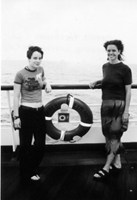

"It was the best three months of my life," was the immediate response from senior Catherine Livingston when asked about the Semester at Sea program last fall. Unlike other study abroad options, the 600 students participating in Semester at Sea attend classes aboard a fully-equipped 23,500 ton ship in between trips to several countries around the world. The Fall semester ship usually takes off from Vancouver and visits Japan, China, Vietnam, Malaysia, India, Egypt, Croatia, Turkey, Italy and Morocco. Students in the Spring semester program leave from the Bahamas and travel to Cuba, Brazil, South Africa, Kenya, India, Vietnam, Malaysia, China and Japan.
Livingston, along with college senior Carole Harbison, was one of the Oberlin students aboard the S.S. Universe Explorer last fall. Livingston admitted that the actual classroom experience was not as challenging as Oberlin courses, but offered a chance to study topics she otherwise would not learn about such as the public health systems of the countries to which she traveled. Harbison agreed, saying, "It's hard to read when the boat is rocking and all you want to do is go to sleep."

Everyone in the program is required to take a core class that addresses the politics, economics and culture of the countries on the itinerary, in addition to many other course options. All faculty members were required to specialize in at least one of the countries, so that when they were "in port," a master drummer teacher might organize a concert ot a belly-dancing teacher might give her students the opportunity to put their skills to work in Morocco and Turkey. Livingston studied Literature of the Sea and Mothering, which discussed the socio-cultural context of motherhood in each of the countries she visited. A lot of classes required that students keep a journal of their travel experiences, which Livingston referred to as "one of the best things I got out of the trip."
Furthermore, she found great value in the opportunity to see firsthand the situations she studied on the boat. The students and faculty spent about five days in each country they went to, with the choice between independent trips with friends or larger group trips organized by the program. Livingston chose to travel with a few friends much of the time, describing this as an opportunity to "put on a backpack and disappear for five days," meeting people and sometimes depending completely on a phrase book to communicate with strangers who were hospitable to the travelling students. However, she did opt to join some of the organized trips, and once stayed in a village of impoverished "untouchables" (outcastes) in Madras, India.
Livingston described the social scene aboard the floating university as a potential "shock to an Obie," explaining that one could find anything one wanted in social activities, including dancing, the bar-scene or drinking tea and talking with friends. Harbison emphasized that the trip is not only about traveling and being a tourist. "You form intense friendships because you are out of your comfort zone - everyone is out of their comfort zone," she said. Livingston also found some competition for Campus Dining Service, saying that aboard the ship was "the best mass-produced food I'd ever had." The kitchen picked up fresh fruit in various countries throughout the voyage.
Livingston emphasized that, without a doubt, she would get back on the boat and travel around the world again if she could.
Collegiate Captains: Seniors Catherine Livingston and Carole Harbison man the ship. (photo courtesy Semester at Sea program)
Copyright © 2000, The Oberlin Review.
Volume 128, Number 14, February 18, 2000
Contact us with your comments and suggestions.